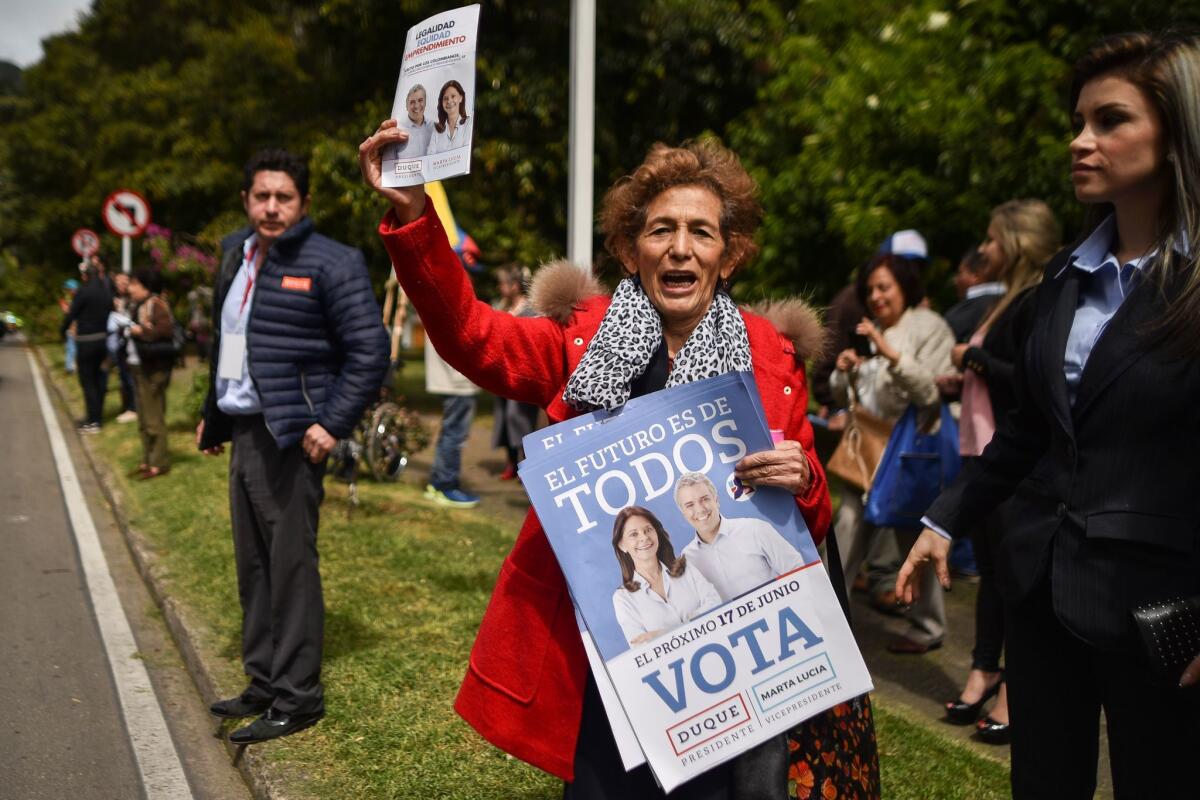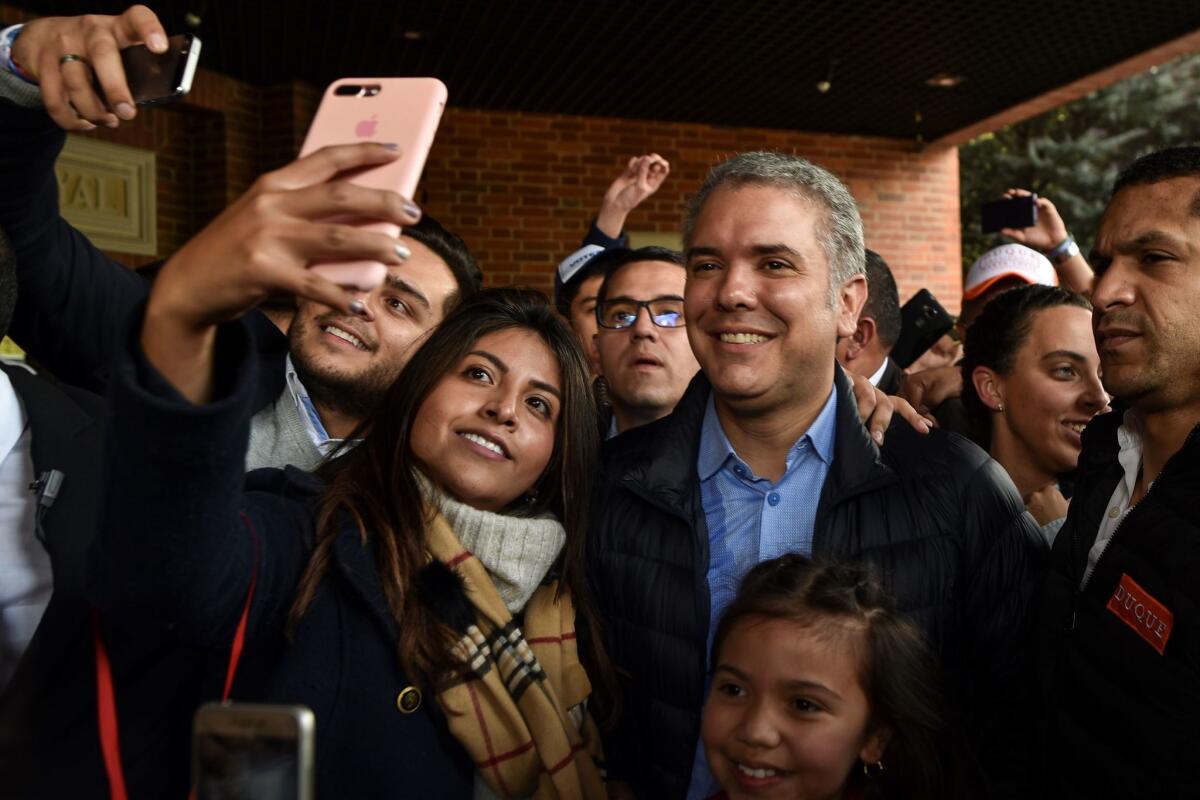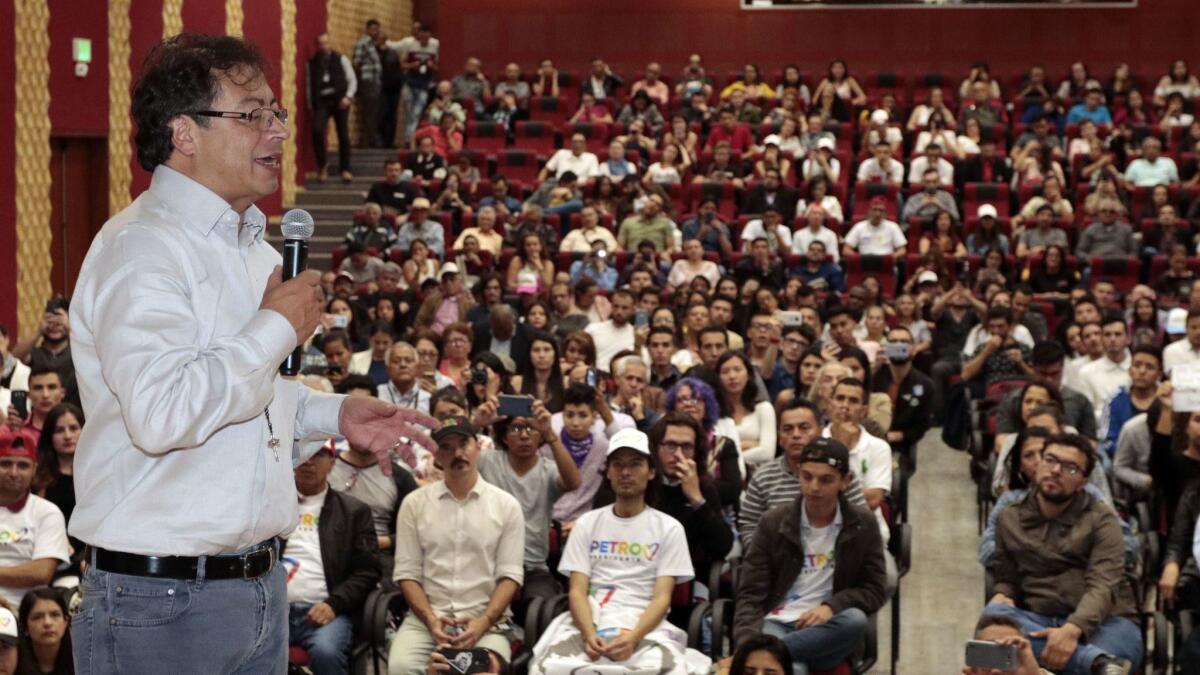Right-wing candidate has the edge going into Colombia’s presidential election

- Share via
With moderates absent from Sunday’s presidential ballot, Colombian voters will choose between two relatively extreme candidates to confront pressing problems including a fraying peace agreement, rising violence and stubborn social and economic inequality.
Public opinion polls leading up to the election gave right-wing Sen. Ivan Duque an edge of between six and 20 percentage points over his leftist opponent, Gustavo Petro. But no one is counting out Petro, a onetime guerrilla and former mayor of Bogota, the country’s capital and largest city. He has been gaining ground in the polls and his backers insist that pollsters often ignore the rural and working class voters who comprise much of his base.
They are vying to succeed Juan Manuel Santos, the centrist president who, during his eight years in office, forged a controversial peace agreement with the rebel Revolutionary Armed Forces of Colombia, or FARC, ending half a century of conflict.
More than 36 million Colombians are eligible to vote, although no more than 50% to 55% are expected to turn out. Sunday’s winner will be sworn in Aug. 7. Although Santos is completing his second four-year term, a recent constitutional amendment limits future presidents to one four-year term.

Duque, a 41-year-old economist, is the hand-picked favorite of Alvaro Uribe, a former president (2002 to 2010) and now senator who, as head of the Democratic Center party, is Colombia’s most popular and powerful politician. Well spoken and youthful, Duque has earned broad support from affluent voters, media outlets and the business community with his promises to cut taxes and institute economic incentives.
Recycling the criticisms of his hard-line mentor, Uribe, who fiercely attacked the peace deal with the FARC as too generous to the rebels, Duque has promised to make changes to the accord, including mandatory jail sentences for guerrillas convicted of heinous crimes, instead of the detention prescribed in the accord.
Critics fear that those harsher penalties, coupled with Duque’s promises to extradite former FARC leaders accused of drug trafficking, could send demobilized rebels back to the jungles to re-arm. The peace agreement already is under threat from right-wing death squads, which have been killing former rebels, as well as by the government’s failure to follow through on economic development promises.
Santos said in a recent speech that the number of so-called “dissident” FARC rebels — those who have abandoned or never joined the demobilization process — may now total up to 10% of the 14,000 rebels and their urban militia supporters who were in the ranks when the peace deal was signed in November 2016.
Petro, 58, strongly backs the peace accord. Before his election in 2011 as Bogota mayor, Petro earned national fame as a senator who fearlessly denounced corruption and several politicians’ connections to paramilitarism. His popularity testifies to Colombians’ widespread disgust with a political class perceived as corrupt and ineffective.

Petro is also an unabashed socialist whose past praise for the late Venezuelan President Hugo Chavez has many Colombians worried that he could lead the country down a populist path. The hundreds of thousands of Venezuelans who have fled to Colombia to escape their native country’s economic ruin are witnesses to where that path could lead.
Other challenges await the new president, in addition to implementing the peace accord. Crops of coca plants, the raw material of cocaine, set records last year, earning the displeasure of President Trump. Other armed gangs including the National Liberation Army rebel group have rushed in to fill the drug trafficking vacuum created in several regions by the demobilization of the FARC.
Ricardo Alvarado, the governor of Arauca province, in eastern Colombia bordering Venezuela, said in an interview that homicides and kidnappings in his state over the first four months of 2018 exceeded the totals for the previous three years combined. He blamed narco turf battles and the emergence of dissident FARC rebels who extort businesses and farmers to raise money.
While the overall economy is going well, both candidates have made proposals — Duque with tax cuts and Petro with increased government spending — that could threaten Colombia’s “precarious” fiscal stability, said Jose Antonio Ocampo, an economist and co-director of Colombia’s Central Bank.
In an interview, Ocampo said a more serious challenge for the new president than balancing the books will be addressing Colombia’s economic inequality, which is at the root of the country’s systemic violence and corruption.
“Colombia is among the most unequal countries in Latin America, in the world,” said Ocampo, referring to the concentration of wealth in the hands of the few. “While other countries, including Brazil and Bolivia, have made progress, Colombia has remained as unequal as in the past.”
A key to addressing it, he said, is in moving workers from the informal economy into the official economy, where they would be taxed and receive government benefits. This is especially important in rural areas, he said, where 84% of workers have no health insurance or government pensions. Other priorities for the new president should include investing in research, education and in national roadways.
Critics have faulted both candidates for their approaches to alleviating Colombia’s inequality. Duque is in favor of “large-scale agriculture, big corporations and major banks” while voicing “no support at all for the agrarian provisions of the peace agreement designed to restore peasants to their illegally confiscated lands,” said University of Miami professor and Colombia expert Bruce Bagley.
Meanwhile, Petro’s proposal to slowly wean Colombia from its economical reliance on oil and coal exports and replace them with agricultural products such as avocados has been slammed as impractical.
Kraul is a special correspondent.
Sign up for Essential California
The most important California stories and recommendations in your inbox every morning.
You may occasionally receive promotional content from the Los Angeles Times.






